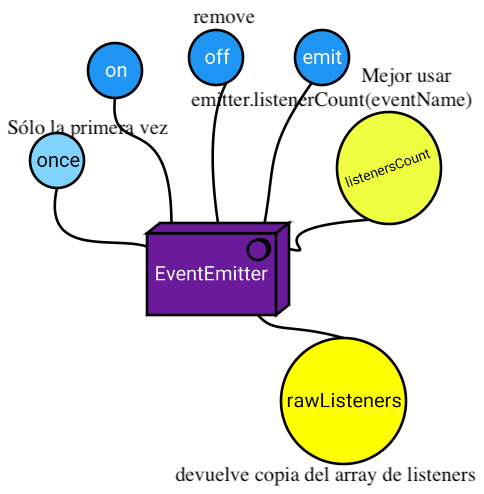# Node.js EventEmitters
EventEmitter is a very important class in Node.js. It provides a channel for events to be dispatched and listeners to be notified. Many objects you’ll encounter in Node.js inherit from EventEmitter, like the Streams class.
# The Observer Pattern
The Observer Pattern
The observer pattern is a software design pattern in which an object, called the subject, maintains a list of its dependents, called observers, and notifies them automatically of any state changes, usually by calling one of their methods.

See also
# La Clase EventEmitter
- Algunos métodos de los objetos de la clase EventEmitter (opens new window):

# on
[~/.../p4-t2-networking/networking-with-sockets-chapter-3-crguezl(master)]$ node
Welcome to Node.js v12.10.0.
Type ".help" for more information.
> const {EventEmitter} = require("events")
undefined
> function c1() { console.log('an event occurred!');}
undefined
> function c2() { console.log('yet another event occurred!');}
undefined
> const myEmitter = new EventEmitter();
undefined
> myEmitter.on('eventOne', c1);
EventEmitter {
_events: [Object: null prototype] { eventOne: [Function: c1] },
_eventsCount: 1,
_maxListeners: undefined
}
> myEmitter.on('eventOne', c2)
EventEmitter {
_events: [Object: null prototype] {
eventOne: [ [Function: c1], [Function: c2] ]
},
_eventsCount: 1,
_maxListeners: undefined
}
> myEmitter.emit('eventOne');
an event occurred!
yet another event occurred!
true
2
3
4
5
6
7
8
9
10
11
12
13
14
15
16
17
18
19
20
21
22
23
24
25
26
27
28
29
# once
> myEmitter.once('eventOnce', () => console.log('eventOnce once fired'));
EventEmitter {
_events: [Object: null prototype] {
eventOne: [ [Function: c1], [Function: c2] ],
eventOnce: [Function: bound onceWrapper] { listener: [Function] }
},
_eventsCount: 2,
_maxListeners: undefined
}
> myEmitter.emit('eventOnce');
eventOnce once fired
true
> myEmitter.emit('eventOnce');
false
> myEmitter.emit('eventOnce');
false
2
3
4
5
6
7
8
9
10
11
12
13
14
15
16
# Argumentos
> myEmitter.on('status', (code, msg)=> console.log(`Got ${code} and ${msg}`));
EventEmitter {
_events: [Object: null prototype] {
eventOne: [ [Function: c1], [Function: c2] ],
status: [Function]
},
_eventsCount: 2,
_maxListeners: undefined
}
> myEmitter.emit('status', 200, 'ok');
Got 200 and ok
2
3
4
5
6
7
8
9
10
11
# off
> myEmitter.off('eventOne', c1);
EventEmitter {
_events: [Object: null prototype] {
eventOne: [Function: c2],
status: [Function]
},
_eventsCount: 2,
_maxListeners: undefined
}
> myEmitter.emit('eventOne');
yet another event occurred!
true
2
3
4
5
6
7
8
9
10
11
12
# listenerCount and rawListeners
> myEmitter.listenerCount('eventOne')
1
> myEmitter.rawListeners('eventOne')
[ [Function: c2] ]
2
3
4
# Ejercicio
Vamos ahora a escribir una clase WithTime cuyos objetos disponen de un método execute que permite ejecutar
una función asíncrona asyncfun que acepta como último argumento una callback cb.
Como es habitual, se supone que la callback es llamada cb(err, data) por asyncfun cuando esta termina su tarea asíncrona.
El primer parámetro err indica el error si lo hubo y el segundo data con el resultado de la operación asíncrona: cb(err, data).
Se pide que:
- La función
executeemita eventosbeginyendseñalando el comienzo y final de la ejecución deasyncfun - Deberá así mismo emitir un evento
resultcon el resultado de la operación asíncrona. - Deberá emitir un evento
timeindicando el tiempo que ha tomado la ejecución en nanosegundos (useprocess.hrtime.bigint(opens new window) para ello)
Por ejemplo, un código como:
const inspect = require("util").inspect;
const ins = (x) => inspect(x, {depth: Infinity, colors: true});
const fetch = require("node-fetch");
const WithTime = require("./with-time.js");
const withTime = new WithTime();
withTime.on('begin', (label) => console.log('About to execute '+label));
withTime.on('end', (label) => console.log('Done with execution of '+label));
withTime.on('result', (label, data) => console.log('Function '+label+' produced:\n'+ins(data)));
withTime.on('time', (label, t) => console.log('Function '+label+' took '+t+' nanoseconds'));
const readFile = (url, cb) => {
fetch(url)
.then((resp) => resp.json())
.then(function(data) {
cb(null, data);
})
.catch(e => console.log(`Buf!\n${e}`));
}
withTime.execute(readFile, 'https://jsonplaceholder.typicode.com/posts/3');
2
3
4
5
6
7
8
9
10
11
12
13
14
15
16
17
18
19
20
21
22
23
24
25
Debería producir una salida como está:
About to execute readFile
Function readFile produced:
{
userId: 1,
id: 3,
title: 'ea molestias quasi exercitationem repellat qui ipsa sit aut',
body: 'et iusto sed quo iure\n' +
'voluptatem occaecati omnis eligendi aut ad\n' +
'voluptatem doloribus vel accusantium quis pariatur\n' +
'molestiae porro eius odio et labore et velit aut'
}
Function readFile took 331675217 nanoseconds
Done with execution of readFile
2
3
4
5
6
7
8
9
10
11
12
13
Esta es una Solución
[~/.../networking-with-sockets-chapter-3-crguezl/event-emitter-tutorial(master)]$ cat with-time.js
const { EventEmitter } = require("events");
class WithTime extends EventEmitter {
// This function executes asyncFunc(...args)
execute(asyncFunc, ...args) {
let label = asyncFunc.name;
this.emit('begin', label);
let old = process.hrtime.bigint();
asyncFunc(...args, (err, data) => {
if (err) {
this.emit('error', err);
} else {
this.emit('result', label, data);
this.emit('time', label, process.hrtime.bigint() - old);
this.emit('end', label);
}
});
}
}
module.exports = WithTime;
2
3
4
5
6
7
8
9
10
11
12
13
14
15
16
17
18
19
20
21
22
23
24